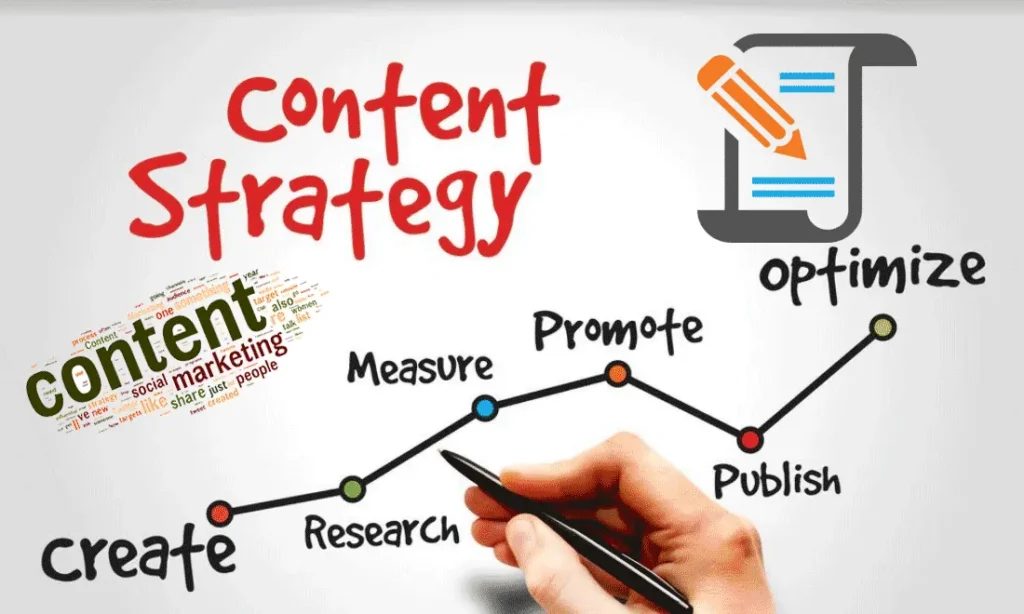Content Marketing vs. SEO: What’s the Difference?

Introduction
Today we discuss Content Marketing vs. SEO When management wants to connect with the clients, it employs content marketing and SEO in the digital marketing space. All the strategies mentioned above make an attempt to gain users, visibility, and restore conversion rates. However, they are indistinguishable Constitution and the Bill of Rights.
It also helps businesses utilize content marketing to promote SEO and any other related online business profiles. When used in conjunction, they bring a sense of synergy that improves traffic and popularity at large. In this article, we distinguished between the two and elucidated how they function and when it is best to use one over the other in your business.
Understanding Content Marketing and SEO
Content marketing is a strategy used to educate and appeal to target consumers by coming up with materials that are useful to the audience. These are Writing that is personalized on blogs, videos, infographics and social media posts. Whereas, SEO encompasses to the process of altering websites in order to increase their ranking on the search engine results.
It involves keyword research, link building, and some adjustments on the site’s technical configuration. Whereas content marketing is a process of establishing rapport with the audience, search engine optimization secures their attention. When combined, they give a perfect solution to enhancing the overall digital marketing tactic that entices, interacts with, and finally converts users.
The Core Differences Between Content Marketing and SEO
While content marketing focuses on creating and sharing content with the ultimate goal of driving target audience engagement, internal marketing aims at achieving identifying the best strategies that are useful when it comes to content marketing and search engine optimization. Its primary goals are to share information, build audiences’ knowledge, and establish a company as an expert.
SEO used all the aspects such as keywords, meta tags, and backlinks to optimize its contents in order to match the search engines. While the first field can be defined as more technical, the second is all about creativity. SEO brings traffic and that is true but if good quality contents are not put up then people are likely to bounce away. It puts all the necessary information businesses need in order to work on their promotion systems and ensure that they do it adequately.
How SEO Supports Content Marketing
It therefore remains to be evident that the success of content marketing relies heavily on SEO. It assists the content in targeting the appropriate audience through ranking in the search engines. This is done by incorporating and using of right keywords, making good headlines and increasing the site speed which makes the content searchable.
There is no doubt, that even unique and great content might be unreached if there is no Search Engine Optimization. It is crucial to apply SEO techniques in the content generation organically for better visibility and traffic generation. This results to an enhancement of the firm’s performance in the online portal and an increase in conversion rates.
The Role of Keywords in SEO and Content Marketing
Almost all things related to SEO and content marketing begin with keywords. They assist the search engines to know what the particular page is all about and how it responds to any search done by the user. Appropriate keywords when used in the content, the title, and meta description benefits the website rankings and visibility.
Nonetheless, there are certain downsides of using keyword stuffing on a website. Rather, natural kinds of keywords should be employed. Using long-tail keywords in the research can also help attract more relevant audience and enhance the interest and the conversion rates.
On-Page and Off-Page SEO: What You Need to Know
In simple terms, on-page refers to factors that pertain internal pages in a website, including the words used in the content, Metadata, and other components like internal links. It helps search engines to comprehend content and place it on proper ranking. Off-page SEO, on the other hand, focuses on external factors like backlinks and social media presence. It helps to achieve the building of website authority and credibility.
On-page and off-page SEO are crucial for the growth and enhancement of the website’s ranking and traffic. A well-designed balanced marketing approach optimally contributes to brand enhancement and firmed up its online marketing operations.
Content Types: What Works Best for SEO and Content Marketing?
Moreover, various types of content are effective for SEO and content marketing. Web logs, video, graphic images and even case studies arrest audience attention and help increase site status in search results. That makes sources which are more trenchant for evergreen content, that is content that remains valuable for a long time, ideal.
Video drives engagement and should be used and can be ranked on YouTube. It is important to note that the use of interactive contents for instance, quizzes and surveys are very effective in enhancing user experience. There are several factors that play a critical role when deciding which content format is suitable for a business such as goals, targets market, and the trends in the industry.
The Importance of Backlinks in SEO and Content Marketing
Backlinks can also be referred to as backlinks and are important for both SEO and content marketing. They also assure credibility and authority to the search engines. Backlinks from reputable websites enhance the website’s ranking while also directing traffic from such sites. It goes without saying that creating high-quality and shareable content creates link backs as people naturally link to good content.
Other ways through which backlinks are earned include guest posting and collaboration with influencers. Still, businesses should not have the use of spammy or low quality links in order to seek top ranking since they are a penalty to SEO. A vigorous backlinking assists and extends ranking into the search engines, as well as establishes credibility on the Internet.
Differences and Similarities: SEO Metrics vs. Content Marketing Metrics
This is important when it comes to enhancing strategies indicated by the need to track performance. When it comes to SEO, one can speak about the successes in the following terms: conversion, organic visitors, keywords, relative bounce rate and others. Some of the content marketing metrics are the engagement, the number of shares or likes on the social networks, and the conversion rate.
Whereas SEO can be solely based on performance, content marketing engage the audience. Google Analytics and Search Console can be used to analyze data more effectively. Coordination of SEO with content marketing means searching for synergy by ensuring that the work accomplished in both fields is strategically focused on the company’s objectives and is productive.
Common Mistakes to Avoid in Content Marketing and SEO
There are some common mistakes that are made by many people with regards to digital marketing that has an impact of the businesses that they are doing. A typical error that people often make is not giving due diligence to SEO when developing their materials.
The end result is that even the best content can be hidden from the reach of the users and not appear among the top search results, even if it is optimized to the best of their ability. One of them is keyword stuffing that may negatively impact on the rankings.
Also, not focusing on mobile optimization and slow page loading also affect the SEO of a website. There is no doubt that Americans have access to a lot of content and, therefore, their interest is being posed less by inconsistent publishing. These mistakes are best to be avoided in ensuring that the traffic and conversion rates are better served through the strategy.
Which Strategy is Right for Your Business?
SEO and content marketing are the two sections of the internet marketing that need to be well-strategised and developed to help business organisations achieve their strategies goals and objectives. Search engine optimization is used with the goal of increasing the number of page views that are obtained through organic search results.
In content marketing, the main goal is to earn the consumer’s permission to market directly to them, communicate with them, and engage them. In an ideal world, success factors should be carried out by businesses using both strategies at the same time. There are two components involved in the success of an e-business; these include good contents and site design that is optimized.
It therefore plays a crucial role in as it facilitates the assessment of budget, resources, and target customers in establishment of the right balance. Integrating basic and advanced approaches increases online performance and company expansion.
Conclusion
Content marketing and SEO are must-haves if one wants to opt for digital strategy to work. Both of them are distinct from each other but complement each other in one way or the other. Where SEO helps put the content in front of the target audience, content marketing then helps retain the audience.
Knowing their differences as well as the advantages that come with each type enables formulation of sound strategies by the businesses. It is possible to reach these goals while avoiding mistakes and keeping track of the results achieved by a company through digital means.
SEO and content marketing have an interaction that produces higher traffic, greater psychological interactivity on web pages, and sustainable growth.






